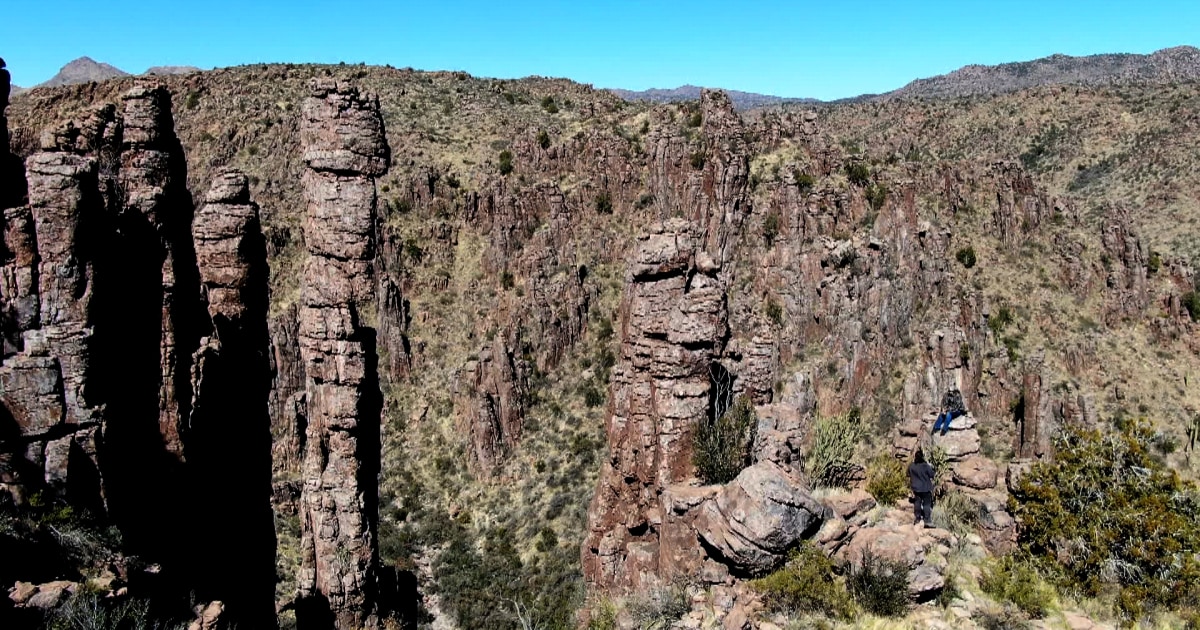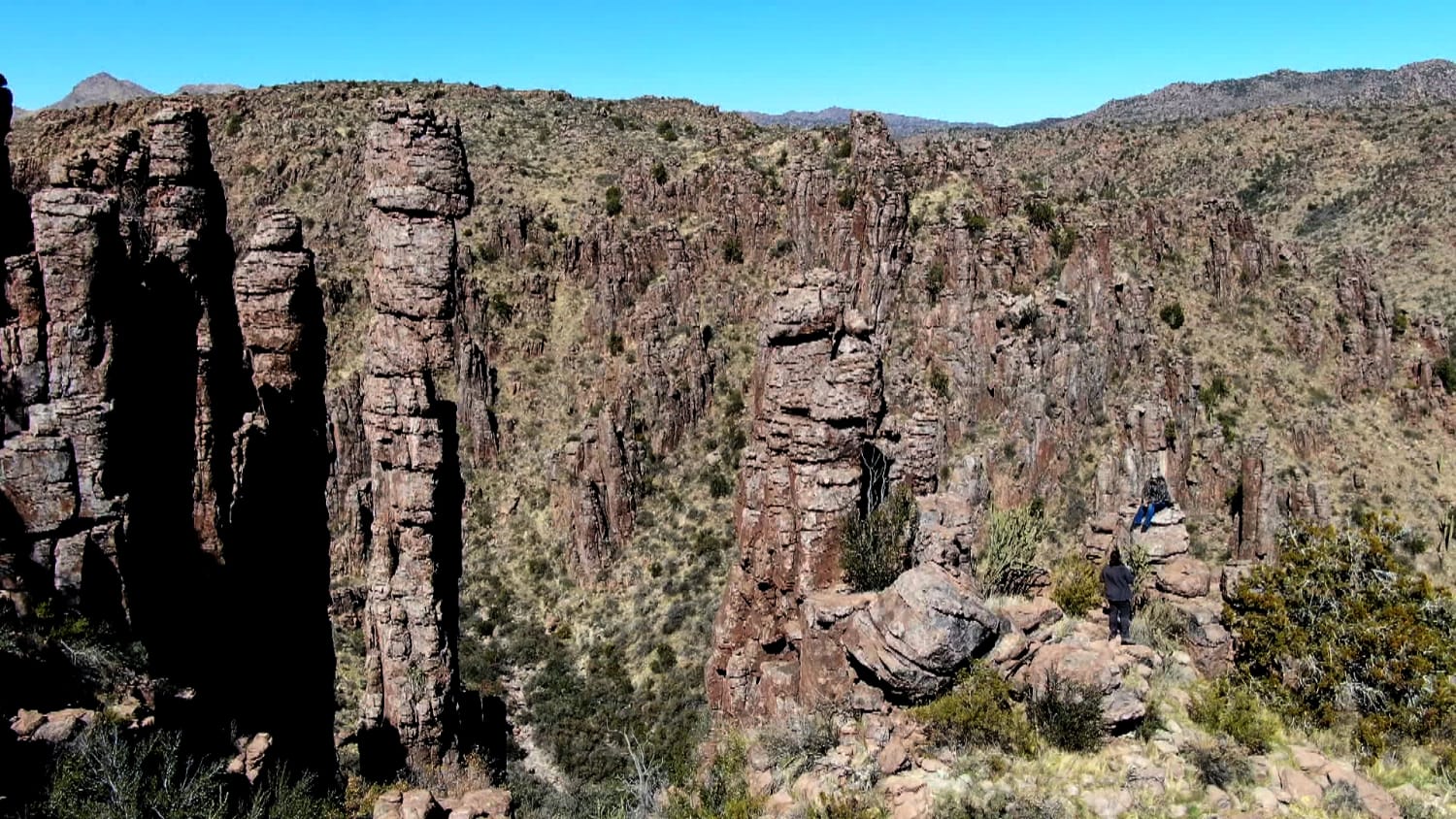
The bill transferred 2,400 acres of national forestland, including Oak Flat, to Resolution in exchange for 5,300 acres of private land owned by the mining company.
Flake declined an interview request. McCain, who died in 2018, touted the project in a 2014 op-ed in The Arizona Republic, saying that the mine would generate jobs and boost the local economy and that the land would remain open to tribal members and others until the company breaks ground.
The legislation stunned and saddened Naelyn Pike, a San Carlos Apache tribal member who first testified before Congress in opposition to the arrangement when she was 13.
“Our cultural identity is being stripped away from us,” said Pike, 21, who is Nosie’s granddaughter.
“No tree can live without its roots,” she said. “And we’re that tree.”
Engineer Vicky Peacey, senior manager of permits and approvals for Resolution Cooper, said that the company is sensitive to the tribal members’ concerns and that it has already modified its mining plans to leave Apache Leap and hundreds of other special areas untouched.
Peacey said company officials have set up a tribal monitoring program, with dozens of trained monitors from several tribes working alongside archaeologists to identify features of the landscape that hold special meaning. “Every plant, every animal, water feature, rocks,” Peacey said. “It’s really helped shape our mining plan.”
Peacey emphasized that the project would employ about 1,500 people and pump about a billion dollars into the economy every year. She also said copper is critical to combating climate change.
Copper is in high demand in the U.S. and around the world, as it is an essential component in such green energy technologies as wind turbines, solar panels and electric cars. The mine beneath Oak Flat is projected to satisfy 25 percent of U.S. demand.
“We have to find a way to balance jobs, economic benefits in these rural communities, as well as environmental protection and cultural heritage preservation,” Peacey said. “I think we can do it in this project.”
The mining company plans to extract the copper using a method known as block caving, which over time will cause the ground to collapse and create a pit that the company acknowledges will be nearly 2 miles long and 1,000 feet deep. Oak Flat, along with its petroglyph-covered walls and Apache burial sites, is set to be swallowed up in a crater deep enough to hold the Eiffel Tower.
The project has the support of many who live in the area, including the mayor of nearby Superior.
“We need for this project to move forward,” Mayor Mila Besich-Lira said, citing its economic benefits.
Besich-Lira said she didn’t understand the “end game” of those opposed to the mine.
“That ore body is never going away, so let’s figure out a solution,” she said. “Let’s figure out ways that this becomes a net positive for people, even though we are going to have to sacrifice some special places.”
Others see it differently. The Arizona Mining Reform Coalition has opposed the mine in large part because of concerns over its impact on the area’s water supply.
“The real Achilles’ heel for this whole project is there’s not enough water,” said Roger Featherstone, the group’s director. “That’s something that has just been impossible for us to get anybody to focus on.”
Legal fight
A group of Apaches and other opponents of the mine took the battle to court in January, suing the federal government to halt the land transfer.
The Apache Stronghold group argued in the suit that the planned destruction of Oak Flat would violate religious freedom protections. It also argued that an 1852 treaty between the Western Apaches and the U.S. gives the tribe rights to the site.
“The Oak Flat Parcel of the proposed Resolution Copper Mine Project is located right smack dab in the middle of the Western Apaches’ 1852 Treaty lands,” the lawsuit says. The treaty was “never amended, rescinded, nor terminated,” it adds.
In court papers filed the day after President Joe Biden’s inauguration, government lawyers argued that Apache Stronghold can’t assert ownership rights to the land because the group isn’t a federally recognized tribe and that even if it were, the land isn’t held in trust for any tribe.
The lawyers, representing the U.S. Forest Service, also asserted that the Apaches faced no immediate harm from the land transfer and that they had failed to show a “substantial burden” on their religious exercise.
“In passing the law that created the land exchange, Congress has determined that facilitating copper mining in Arizona and expanding the Tonto National Forest—a forest which services multiple public purposes including providing recreation opportunities and habitat conservation—is in the public interest,” the government lawyers wrote.
The Apaches have already suffered one legal defeat. The judge denied their emergency request to block the transfer.
U.S. District Judge Steven Logan acknowledged that the mine would “close off a portal to the Creator forever and will completely devastate the Western Apaches’ lifeblood,” but he said the loss didn’t appear to breach religious freedom laws. He concluded that the Apache Stronghold group lacked legal standing because it represented individuals rather than a tribal government.
Apache Stronghold is appealing the decision, and the broader case continues. Two more lawsuits have been filed to block the project.
The Apaches got a rare piece of good news Monday when the Biden administration retracted an environmental impact review of the project. The review, which the Forest Service had released just five days before Biden took office, set in motion a 60-day countdown to the land transfer. The handling of the review had drawn sharp criticism as an attempt by the Trump administration to hobble future efforts to disrupt the project.
The abrupt retraction means the land transfer will no longer take place March 11. The Agriculture Department, which oversees the Forest Service, said in a statement that it wanted to conduct a thorough review of the project.
Source: | This article originally belongs to Nbcnews.com










